A simple Spanish dish with meat
Thursday, March 30, 2017
Today I want to show you a simple recipe: "Veal sirloin with mushroom sauce”.
These are the Ingredients that you need to cook it: 4 steaks of veal sirloin about 150 grams each one. 250 grams of mushrooms. 100 grams of serrano ham. Chopped parsley. 1 onion. 1 lemon. Olive oil. Salt.
The first thing you have to do is: spread the 4 steaks, on both sides, with olive oil, and let it stand.
After that, you have to thoroughly brush the mushrooms, to remove the soil, to put them in water with a few drops of lemon, to wash them, to drain them and to cut them in sheets.
Then, you have to peel and chop the onion.
You have also chop the ham.
Now, you have to pour oil, in a frying pan, put the onion, stir with a wooden spoon and let to light fire, for 3 minutes, until the onion is transparent. Add the ham and remove a little bit; add the mushrooms and leave it about 8 minutes, stir again with the wooden spoon.
Then, make the sirloins on the grill, on both sides, in a pan, and pour the salt, on each side, when they are already made. Place each one, on a plate, and pour the mushrooms with the ham and onion, above, and wash all down with the juice, that there is on the pan. Serve with chopped parsley on top.
And the result must be similar than this one in the picture:
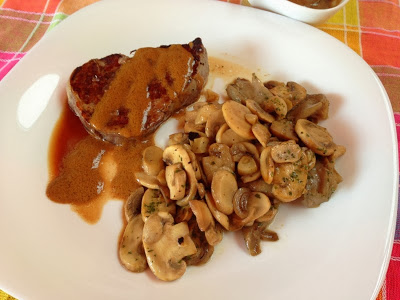
Well, I hope that you have liked this recipe and you want to try to cook it.
Until my next post, kind regards,
Luis.
Sponsored by Costaluz Lawyers.
Please click below:

 0
Like
Published at 11:40 AM Comments (0)
0
Like
Published at 11:40 AM Comments (0)
Spanish scientists create viruses against tumor cells
Monday, March 27, 2017
Today I would like to share with you a very important news: “Spanish scientists create viruses that attack the tumor cells selectively”.
Effectively, Scientists from the August Pi i Sunyer Biomedical Research Institute (IDIBAPS) and the Biomedical Research Institute (IRB), in Barcelona, have succeeded in getting that some genetically engineered viruses attack tumor cells selectively, without affecting their healthy cells.
The work, published in the journal Nature Communications, is the result of the work of a doctoral thesis of Eneko Villanueva and it has been co-led by Cristina Fillat, chief of the genic therapy and cancer, from the group of the IDIBAPS, and Raúl Méndez, a researcher of the IRB.
According to Mendez, conventional cancer treatment can cause unwanted side effects due to poor selectivity and, to avoid, the researchers seek new treatments capable of efficiently eliminating cancer cells and preserving healthy ones.
One of the new therapies, in cancer, is based on the development of oncolytic viruses, ie, viruses modified to only infect tumor cells.

Tumor cells infected by virus
Genetically engineered viruses have been created, in the last few years, to maximize their anti-cancer effect, but as the virus's potency increases, so the associated toxicity does it.
The IDIBAPS and IRB researchers have developed an innovative approach, to provide an adenovirus (an Adenovirus is a non-encapsulated double-stranded DNA virus, which can lead to infections in the airways, conjunctivitis, cystitis, haemorrhages and gastroenteritis), with high specificity, against tumor cells.
"We have taken advantage of the different expression of a type of protein, CPEB, in normal and tumor tissues", Mendez said.
The CPEBs are a family of four proteins, joined to the ribonucleic acid (RNA) --the molecules that carry information from genes, to synthesize proteins--, that control the expression of hundreds of genes and maintain the functionality and capacity of tissue repair, in normal conditions.
When the CPEBs become unbalanced, they change the expression of these genes, in the cells, and contribute to the development of pathological processes such as cancer.
"We have focused on the double imbalance of two of these proteins, in healthy tissues and tumors: on the one hand, we have CPEB4, which, in previous studies, has shown that it has high expression, in cancer cells, and it is necessary for tumor growth, and, on the other, CPEB1, highly expressed in normal tissue and lost in the tumor", Méndez added.
"We have taken advantage of this imbalance, to make a virus that only attacks the cells with high levels of CPEB4 and low of CPEB1, which only affects the tumor cells, ignoring the healthy ones", the researcher summarized.
Cristina Fillat has specified that, in this research, they have worked with "adenovirus, a family of viruses that can cause respiratory infections, urinary tract infections, conjunctivitis or gastroenteritis, but possess characteristics that make them very attractive to be used as therapy against Tumors".
To modify the genome of this virus, the researchers inserted sequences that recognise the CPEB proteins, in key regions, for the control of viral proteins, and verified their activity of in vitro models of pancreatic cancer and observed a growth control of the Tumor, in mice.
The oncoselective viruses created are very sophisticated, because they are activated for CPEB4, but are repressed for CPEB1, whereby the researchers achieved attenuated viral activity, in normal cells, while, in the tumor cells, the virus potency is maintained or even increased.
"When the modified viruses enter the tumor cells, they replicate their genome and, on leaving, destroy the cell by releasing more particles of the virus, which in turn can infect more cancer cells", said Fillat, who stressed that "This new approach is very interesting, since it is a therapy that is selectively amplified in the tumor itself".
The researchers now seek to combine this treatment with therapies, that are already in clinical practice or in very advanced stages of development, to seek synergies and be more effective in controlling the tumor.
I hope that researchers will continue to advance in the possible combination of this innovative treatment, with some therapies, already existing in the clinics of Spain.
Until my next post, kind regards,
Luis.
Sponsored by Costaluz Lawyers.
Please click below:

 2
Like
Published at 10:17 AM Comments (0)
2
Like
Published at 10:17 AM Comments (0)
A web that shows you the cultural landscapes in Spain
Monday, March 20, 2017
Today, I would like to recommend you a website, which covers the Spanish cultural landscapes.
The Ministry of Education Culture and Sports has presented the interactive platform 'Narrando paisajes' (“Narrating landscapes”), which announces and disseminates, form the cultural landscapes of Spain, in a virtual way.
'Narrando paisajes' (www.100paisajes.es) allows the user to navigate the Spanish geography, to select any of its landscapes or to interact with additional information, from videos recorded by dron, mobile phones, action cameras, photographs, historical records or cinematographic scenes.
They include landscapes from all autonomous communities, modeled throughout time, by activities as diverse as agriculture, urban settlements, land defense, historical events, trade or industry. They are part of the Spanish cultural heritage and they are the result of some of the most extraordinary interaction processes, between man and the natural environment.
For example, one of the chosen landscapes is Las Médulas (province of León, autonomous community of Castille-Leon).which is Spanish Cultural Heritage.

Las Medulas
The platform has been promoted by the Cultural Heritage Institute of Spain and developed, under the National Cultural Landscape Plan, by the Cultural Landscape Research Group of the Polytechnic University of Madrid, with the support of the Spanish Foundation for Science and FECYT Technology.
Well, I hope that you want to visit that website and perhaps you can visit any of those landscapes –in that case, I hope that you enjoy it--.
Until my next post, kind regards,
Luis.
Sponsored by Costaluz Lawyers.
Please cvlick below:

 2
Like
Published at 11:23 AM Comments (1)
2
Like
Published at 11:23 AM Comments (1)
Spanish and Mexican scientists design a material to clean water with fruit peels
Friday, March 17, 2017
The day before yesterday, I found a very curious news: "Some scientists design a material to clean water contaminated with fruit peels".
Indeed, Spanish and Mexican researchers have developed a method to clean water, containing heavy metals and organic compounds, that are considered pollutants, from a new adsorbent material made with fruit peels, such as orange and grapefruit.


Orange peel
These waste pose a problem for the food industry, as they are waste that occupy a large volume and have no great profits at present. It is estimated that the world produces 38.2 million tons of these shells, from the food industry, each year.
The study, which was attended by the University of Granada (UGR), the Center for Research and Technological Development in Electrochemistry (CIDETEQ), and the Center for Engineering and Industrial Development (CIDESI), both from Mexico, has served to design a novel process in which, thanks to a controlled instant decompression treatment, it is possible to modify the structure of these residues, giving them adsorbent properties such as greater porosity and greater surface area.

The Faculty of Sciences of the UGR
The Researcher, Luis Alberto Romero Cano, of the Research Group on Coal Materials at the Faculty of Sciences of the UGR, explains that through a subsequent chemical treatment, they have been able to "add functional groups to the material and make it selective, to remove organic pollutants and metals present in water".
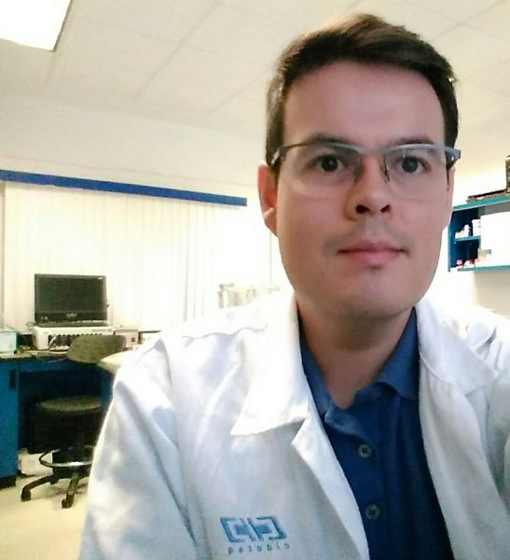
Luis Alberto Romero Cano
A subsequent study of these researchers has shown that it is possible to pack these new materials, into fixed bed columns, similar to a filter, by which contaminated water is passed through a process, with a continuous flow, as the treatments of sewage are performed. Through this laboratory-scale study, it has been possible to obtain design parameters, to project the use of these materials, on a larger scale.
"The obtained results show great potential of use of these materials, as adsorbents, capable of competing against the commercial activated charcoal, for the adsorption and recovery of metals present in the waste water, so that sustainable processes could be carried out, where products with high commercial value, from waste of the food industry", says Romero Cano.
Well, I hope that you have liked this curious news, such as I have.
Until my next post, kind regards,
Luis.
Sponsored by Costaluz Lawyers.
Please click below:

 1
Like
Published at 9:41 AM Comments (0)
1
Like
Published at 9:41 AM Comments (0)
A new study about Parkinson's in Spain
Tuesday, March 14, 2017
Today, I would like to talk to you about a new study, which says that “300.000 people have Parkinson´s in Spain”.
In addition, this study indicates that, each year, a new case is diagnosed per 10,000 inhabitants, according to a study, in which the Complutense University of Madrid (UCM) participates and in which almost a hundred Studies have been reviewed, to analyse the incidence of the disease in our country.
Also, from the different articles studied, the scientists have made an estimate of the cost that this pathology can come to ---+suppose to each patient. So, they have concluded that if some advanced therapies, such as deep brain stimulation, duodopa or apomorphine pump, are used, this can amount to between 17,000 and 50,000 euros, per patient, a year.
However, these people are usually a minority within the group, since only a small number of patients meet the appropriate requirements to qualify for these treatments.
"There are very few studies on costs and they are rather estimates, that take into account direct and indirect costs. There are European estimates that speak of a cost of around € 8,000 a year, per patient; but there are no good studies in Spain", the neurologist, Rocío García-Ramos, has explained, in the Movement Disorders Unit, at the San Carlos Clinical Hospital in Madrid.
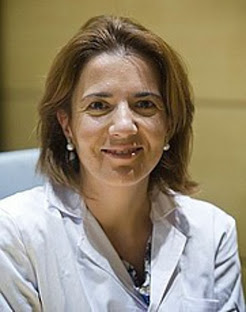
Rocío García-Ramos
Also, the study, published in the journal Neurology, emphasises that the highest incidence of the disease is in people between 70 and 79 years. In the case of women, the highest prevalence occurs up to 85 years. In addition, the mortality, from this disease, is double that of people who do not suffer, from the disease, and their quality of life become deteriorated acutely, as the disease progresses.
The main symptoms are tremors in hands, arms, legs, jaw and face, along with stiffness in the arms, legs and trunk. In addition, patients move slowly and present problems of balance and coordination.

Finally, the study also includes the results of forty questionnaires, sent to neurologists, from different Spanish hospitals, specialised in the disease. Although, in all the autonomous communities, there is at least one unit specialised in Parkinson's, the majority are formed exclusively by neurologists. Thus, apart from Hospital Clínic (Barcelona) and Virgen del Rocío (Seville), these teams do not include speech therapists, physiotherapists, psychologists either psychiatrists.
Well, I hope that scientists follow researching about this sad disease.
Until my next post, kind regards,
Luis.
Sponsored by Costaluz Lawyers.
Please click below:

 0
Like
Published at 11:56 AM Comments (0)
0
Like
Published at 11:56 AM Comments (0)
The Spanish Economy grows above average in Europe
Thursday, March 9, 2017
Last Thursday, March 2, I was able to listen, on the radio, an interview with the Spanish Minister of Economy, Industry and Competitiveness, Luis de Guindos. It seemed like a very interesting interview and I would like to share it with you; but, as it is a little long, I will try to summarize it.
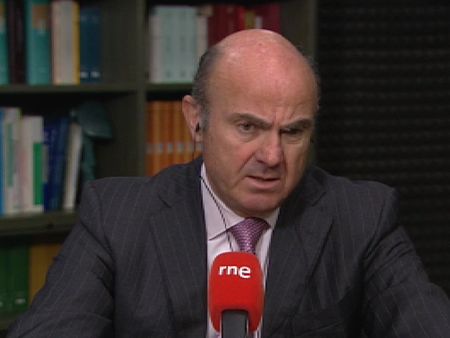
The Minister begins the interview by commenting on the EPA (Active Population Survey) data, which appeared on the same day: growth of 0.7% of Gross Domestic Product (GDP), in the fourth quarter, and 3.2%, in the whole of the year. In this sense, De Guindos says: "This is a very positive fact, because we are growing twice as much as Europe is growing ... and, besides, it is not only the intensity of growth, but also the quality, ie , it has occurred with a recovery of the domestic demand, but with a lot of contribution of the exports. Spain has a historical record --that never had had-- of Current Account Surplus / Balance of payments, of more than 2% of the GDP, for the fourth consecutive year ... And, as a last resort, it is not the quantity, but the quality: when one sees the quality of the fundamentals of growth --which is accompanied by a very positive evolution of the labor market--, this Is an indicator that, in the future, the first quarter of this year will continue with a positive growth, with employment generation and that we started 2017 with a remarkable inertia”.
The Minister assures that “the growth of 2.5% is practically guaranteed”. De Guindos says that, in the Ministry of Economy, they are satisfied, because their projections are being fulfilled and this is not only important to correct, but for a very important principle in Economics, which is: credibility.
By the way of this datum, he says that “In this quarter, we will be at the level in which we were in the pre-crisis income: this is a partial consolation, because we are going back to the year 2007, but ... of course, Spain has lost a decade ...! --because Spain should have to have grown from 2007 to 2017--, then, we are at that starting point in 2007 --for example, if Spain had grown, by an average of 1,5% annually, now we would have an income of between 15 and 20% higher--...., we lost 10% of our wealth, at the beginning of 2013 ..., that we have just recovered, but we have to recover it that we have stopped growing, because of the worst crisis of the history, that we have suffered from 2007 to 2014”.
De Guindos comments on the latest Survey of Active Population, about employment in Spain, in the last quarter of 2016, --according to the APS, unemployment fell by 9,355 people and Social Security membership increased by 74,080 people-- and he says : "Well, February is a month of transition ...., we are getting closer to the good season ..., there has been a drop in unemployment, there has been an increase in affiliations ..., they are certainly positive data and this indicates that the Spanish Economy continues to grow, continues to create jobs ...., there is still a lot to do, of course --we still have 18.6% unemployment in Spain--, but it is evident the strength that we had, in 2016 and in 2015, and this data ratify it. The employment data is a consequence of economic growth and economic growth is a consequence of the reduction of macroeconomic imbalances, and these are indicators on this trend is perfectly feasible in the coming months and in the next quarters”.
The presenter of the program asks: "When will we have the pre-crisis unemployment data?" and the Minister answers: "Well, we need about a million and a half job creation. We have recovered more than half, in terms of affiliates, in terms of APS; If we can keep the rhythm of job creation, around half a million jobs a year, we still need 3 years, that is the goal: to go to 20 million employees, as we had at the pre-crisis level, and so we still need a Million and a half; So we have to continue making every possible effort --the Spanish Government and Spanish society .....,especially the private companies, which are the ones that create jobs-- , to continue with the effort”.
De Guindos talks about quality in employment, from now on: "The issue of quality is very important, but if we look at the data of employees in Spain, according to the Survey of Active Population, the 75% have an Indefinite Contract, there has been a change in the Economic Model, which has led to an increase, in the number of workers, in the labor market. Undoubtedly has a significant impact, from the point of view of employment --for example, the Construction was the main source of growth and employment generation, in the years 2005, 2006 and 2007, now this is not happening, now they are exports and , logically, the workers, who are in different sectors to the one of Construction, need a type of formation, a type of abilities different from the ones that they had before, because Construction did not demand a specific type of formation; that is why active policies and training policies are vital; It is necessary to try that those workers, who have lost their employment in Construction, are going to be placed in other sectors, that have more to do with the Export sector, which also gives more stability to the Spanish Economy”
The Minister wanted to highlight “the enormous effort that Spain has made to reduce the Public Deficit, which was at 11% and now, this year, we have to go 3.1%”. And he also emphasizes that “the tax collection, in January and February, has increased notably; he says that “we have entered with a cruising speed of 3%, in 2017 --it is feasible to reach 2.5%-- ; and this optimism is due to the reforms that we did in 2013, 2014 and 2015. And Brussels has positively valued those reforms. Spain, now, is not in that uncertainty, that we had, facing Europe”.
Well, the interview was longer, but I think I have offered you enough information, about what the Minister De Guindos thinks about our Economy.
I hope that you have liked this interview.
Until my next post, kind regards,
Luis.
Sponsored by Costaluz Lawyers.
Please click below:

 0
Like
Published at 11:37 AM Comments (0)
0
Like
Published at 11:37 AM Comments (0)
A second Spanish and professional opinion on the Mediterranean Diet
Thursday, March 2, 2017
Today I would like to offer you a second opinion, which I just listened on the radio, about the Mediiterranea Diet and especially with Extra Virgin Olive Oil.
To talk about this topic, so important and interesting, for millions of people around the world, on the radio was, as a guest: Miguel Angel Martínez González, who is a Professor, at the University of Navarre (North of Spain) and a lecturer at Harvard University. The Professor Martínez has been looking for scientific evidence of the benefits of our Mediterranean Diet, for 20 years. The Professor Martinez says that, specially young people have forgotten about the Mediterranean Diet. He says: "In a collaborative study, funded by the Carlos III Health Institute of Madrid, after a decade of working, in this macro study, called PREDIMED (Prevention with Mediterranean Diet), we have been able to demonstrate, with the best scientific possible evidence, that the Mediterranean Diet reduces cardiovascular disease, by 30 percent, that is: we followed the people, we told a group to eat Mediterranean Diet, we told another group to eat a diet ... –-which was the Group Control--, which was recommended by the American Heart Society, and after many years of monitoring, we were counting how many heart attacks, stroke and how many cardiovascular deaths occurred, in each group, and we saw this relative reduction, impressive, about 30 per cent of the risk --this is the best scientific test, which you can have on the relationship between Diet and Health--".
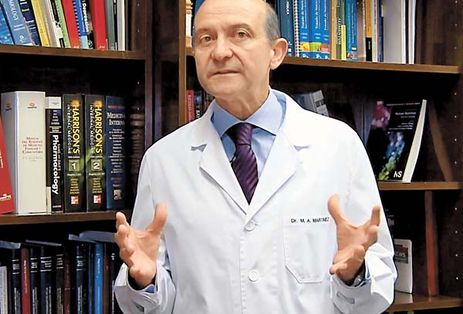
Professor Miguel Angel Martínez
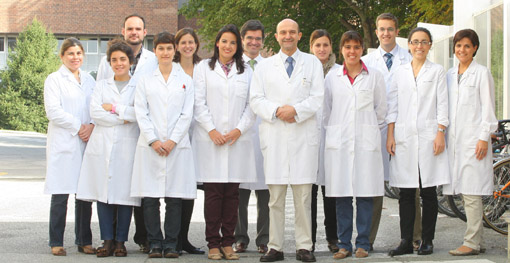
The Professor Martinez and his team
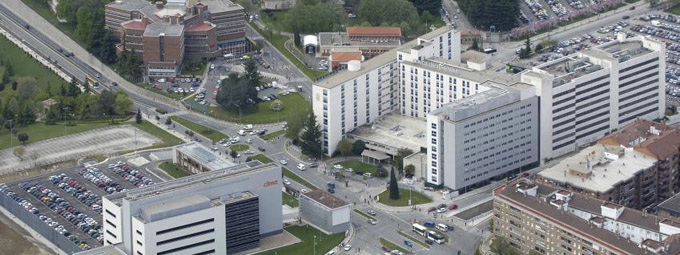 The University-Hospital of Navarre The University-Hospital of Navarre
The Professor explained that "The PREDIMET trial is a collaborative effort of many Spanish research teams, it is an idea that arises in Catalonia, later we incorporated Navarra and, from these groups, other research teams from 8 Autonomous Communities were incorporated. We recruited 7,447 people (men and women, among 55 and 80 years old), who were at high cardiovascular risk, but who had never had a cardiovascular disease, and assigned them at random to follow 3 diets (2 of them were a Mediterranean Diet --in one of them, we gave Extra Virgin Olive Oil, we gave them 15 litres, every 3 months, so that they and their families consume 1 litre, every week --In the second group, with Mediterranean Diet, we gave them nuts --half of almonds and half of hazelnuts--, to consume at least 30 grams each day). And the third group, randomly assigned, it was a low-fat diet --which was the current recommendation by the American Heart Association in those days--. Then, these three groups received visits from Dietitians, every three months, they had group sessions, we gave them cooking recipes, shopping lists, menus, they were explained the Mediterranean foods or foods low in fat --according to the group-- and we were monitoring them, year after year, during ... this began in Navarre, the first recruited were in Navarre, in 2003, then joined the other Centers and we stopped the trial, in 2010, when we already had Data to 2010, on the recommendation of an External Advisory Committee --which told us that there was enough scientific evidence and that continuing the trial would not be ethical, because there was already a very significant 30 percent, statistically, of risk reduction of Cardiovascular mortality, strokes, and stroke in the two Mediterranean diet groups, compared to what until then was the paradigm of a healthy diet --which was what the Americans advocated, which was a low-fat diet--. So this was a spectacular demonstration --because there is no other study, which has achieved similar results in the world-- , the benefits of the Mediterranean Diet for cardiovascular prevention”.
The Professor continues saying: “Then, in 2013, and also in Navarre, we started another study (PREDIMED PLUS), in which we also gave away olive oil and nuts; but the recruitment has also been completed --and we also have almost 7,000 participants--. In this second study, the Mediterranean Diet, we added two more things: weight loss and physical exercise. In the first study, we did not do anything, specific, to lose weight and we did not introduce any program of physical activity; Now, we added these two things and we have many more contacts with the participants: instead of having one, every three months, we have had three, every month, in the first year; ie, it is a very intensive study”.
The Professor Martínez explains the consequences of these benefits, with the Mediterranean Diet: "The first important thing is that the first two causes of mortality, in Spain and in the world, are reduced by 30%: myocardial infarctions and stroke. Afterwards, the reduction in breast cancer --in patients, who specifically received Extra Virgin Olive Oil, it was reduced to one-third, that is, two-thirds of the risk of breast cancer was eliminated--. We have also shown the reduction, in the risk of Arithmias --with Mediterranean Diet, rich in Extra Virgin Olive Oil--. The main Arithmia is Atrial Fibrillation: one in every 4 people, from the age of 40, will develop this disorder of heart rate --which greatly increases the risk of thromboembolic phenomena ..., of brain ..., which deteriorates the quality of life, exercise capacity .... and this was reduced, by 38%, the risk of developing Auricular Fibrillation--. Another problem, that was reduced --the most reduced-- was Peripheral Arteriopathy --which are problems of circulation, in lower limbs, which mainly affects Diabetics and smokers--; well, with the Mediterranean Diet, the risk of having these circulatory problems, in lower limbs, was significantly reduced to less than half. The Type 2 Diabetes was also reduced: half of our participants were not diabetics, when we started the trial, and then we were seeing how many became diabetics, during this long journey, which has taken us a decade of our lives, and we were seeing that, with ExtraVirgin Olive Oil and the Mediterranea Diet, and, to a lesser extent, with nuts and Mediterranean Diet, but also reduced the risk of developing Type 2 Diabetes, which is a great pandemic, that we have, right now, worldwide: it is estimated that people born, In the United States, in the year 2000, one in three will develop Diabetes and now we are approaching 10% of Diabetes, in most countries --10% of the adult population with Diabetes--. Knowing how to prevent Diabetes has been a great teaching of the PREDIMED trial. The advantage of this trial was not only that we observed what people ate, but we told them what they had to eat; ie, it was an intervention study, which we call Randomized --randomly assigned--, with which, the participants were exactly the same, in all, the three groups, except in their diet, and this gives the stronger scientific evidence, that there may be, that a diet can reduce this type of diseases”.
Well, I hope that you can now have a more clear idea about the importance of the Extra Virgin Olive Oil.
Until my next post, kind regards,
Luis.
Sponsored by Costaluz Lawuers.
Please click below:

 2
Like
Published at 11:52 AM Comments (0)
2
Like
Published at 11:52 AM Comments (0)
Spam post or Abuse? Please let us know
|
|